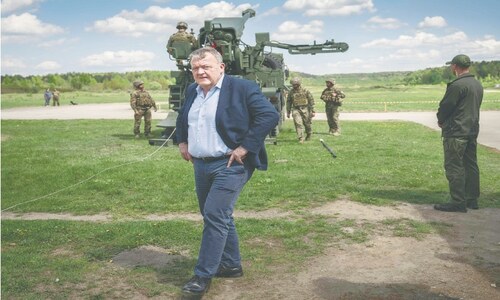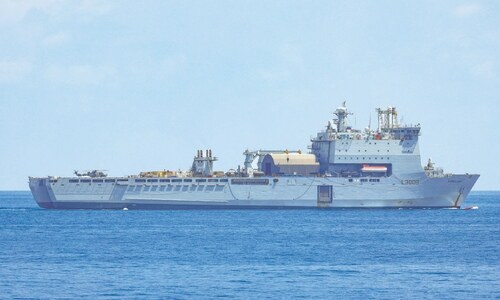LONDON: As a pro-European I have never had any illusions: building Europe is partly about nobility of purpose and partly about naked power politics — the two have always sat in tension. But this weekend in Brussels there was very little nobility of purpose; what we watched was the descent of Europe’s states into a devil-take-the-hindmost battle for advantage in which the EU is a milch cow — something from which you greedily take rather than give. It was a dismal spectacle.
The Polish Prime Minister’s walkout was because he could not get 100 per cent of what he wanted — the maintenance of an absurd over-allocation of voting power. But then Germany would give no ground either. The British disease of curmudgeonly defending our ‘red lines’ to the last has infected everyone, plunging Europe into a clash of interests that may prove irreconcilable.
The predominant sentiment is a lack of generosity that is costing Europe dear. In Britain, and increasingly around Europe, the EU is seen as a force with a life of its own that is aiming to regulate and squeeze the lifeblood from those vital defenders of sovereignty and legitimacy: the member state. It matters not that nation states are increasingly circumscribed in what they can do in an age of globalisation, and have all manner of legitimacy crises themselves.
It matters not that when Europe acts together — as it did in toughing it out with the Americans on steel tariffs — that countries achieve collectively what they cannot alone. And it matters not that Europeans are culturally and philosophically close to each other.
We’ve chosen to regard the EU not as something we have built and are proud of but as our enemy.
What each individual leader in Brussels this weekend knew was that he would have to justify any concession to growing nationalist sentiment at home — and that saying you are helping to build Europe is a tough sell.
In Leszek Miller’s case, with parliamentary and public opinion unanimously of the view that Poland must take and not give, it was impossible.
The pity is that the consolidation of five and a bit European treaties was ever described as a ‘constitution’, with all the unflattering comparisons with the US Constitution (which has its own rambling and dreary passages).
This is a treaty, as it explicitly states, between high contracting parties — the states of Europe — on the basis of former treaties. It seeks to regulate inter-state relationships and to make existing EU institutions — the Presidency, the Parliament and the Commission — work better in an EU of 25 states. And that’s it, in all its cumbersome glory.
The call for a referendum in Britain can now be seen more clearly for what it was: a spoiling mechanism to get in the way of European integration, driven by the same combination of euroscepticism and nationalism that defines Poland’s position. As a tool for resolving the big question, the motives behind it were always disingenuous. Even had the pro-Europeans won, the aim to do down Europe would have remained.
Yet we Europeans have a lot in common. Europeans believe in a social contract — the big idea behind the NHS and state education. Europeans believe that their civilisations are enriched by public interventions and institutions — from public footpaths to public service broadcasting.
They believe that ownership comes with obligations and responsibilities and is not simply a means of getting rich quick. And Europeans have an interest in seeing the world governed by multilateral law and institutions.
But who says this? Not Spain’s Jose Aznar or Poland’s Miller. Not Gordon Brown, the brilliant British Chancellor (finance minister) but latest recruit to the eurosceptic ranks. Too few politicians will stand up for a vision of Europe, and make the case for it with their peers and publics; too few writers and intellectuals will make the case, either.
We are drowning in a sea of mutual spite and the legalistic legacy of successive treaties. Until more put their head over the parapet and fight for what I regard as a necessary and inspiring idea, we might as well — to follow William Pitt — roll up that map of Europe. It will stagnate and decline in the shadows of our mutual recriminations.—Dawn/The Observer News Service.
















































Dear visitor, the comments section is undergoing an overhaul and will return soon.